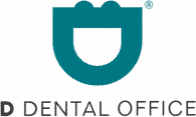TMJ & Occlusion Treatments
at the D Dental Office in the West Island
We bring your teeth and jaws to their perfect position to treat many of your hidden problems and bring back your smile.

Consult: 40 min
Dental occlusion is how the lower teeth contact the upper teeth and function in relation to the best position of the jaw joints, called TMJs (temporomandibular joints). Establishing ideal occlusion is very important to maintain our health and comfort in the short and long term, in order to avoid occlusal disease and preserve the integrity and longevity of all our dental restorations.
Over 90% of people suffer from malocclusion
Malocclusion is one of the most common origins of many oral health problems.
TMJ Disorders
TMJ or Temporomandibular Joint disorder is very common among Canadians. An estimated quarter to a third of us suffer from problems related to the jaw joint. TMJ is the most complex joint in the body. TMJ damage and pain can occur for two main reasons:
- Physical trauma: an accident, a blow to the chin or the head, a fall, or even a whiplash can cause damage to one or both TMJs.
- A malocclusion: a lack of harmony between the bite and jaw joints that can cause destructive damage to teeth, gums and joints and may become severe and irreversible. Over time, malocclusion can lead to an occlusal disease.
Occlusal Disease
- Tension, headaches and migraines
- Neck, shoulder and back pain
- Posture problems
- Tooth sensitivity
- Pain behind eyes
- Excessive tooth wear
- Fractures and dental cracks
- Excessive dental mobility
- Bruxism (excessive grinding or clenching of teeth)
- Gingival recession (gum recession)
- Ringing in the ears, ear pain
- Vertigo
- Damage to jaw joints with or without pain
- Cracking of jaw joints with or without pain
- Spasms of the muscles of mastication or muscles of the neck
Bruxism
Three out of four Canadians grind their teeth at night. Teeth grinding or bruxism can cause significant damage to the teeth and jaw joints and premature aging of the masticatory system. It is a major factor in the development of occlusal disease.
It is essential to prevent and manage it, although it is often undetectable by the person who grinds.
Bruxism can cause one or more of the following problems:
- Wear, fracture, mobility and tooth sensitivity
- Gingival recession or loosening of the gum
- Pain and cracking of the jaw
- Tension, headaches and migraines
- Neck, shoulder and back pain
Dr. Karim El-Samra is certified by the Canadian Institute of Occlusion and has been treating patients with malocclusion since 2014.
Getting a proper TMJ Diagnosis
All patients who undergo their complete dental exam at D Dental Office received a thorough TMJ and Occlusion diagnosis allowing them to treat and manage their TMJ problems.
Equilibrated Night Guard
An equilibrated night guard, followed by a dental equilibration, helps preserve your teeth and joints’ long-term health and integrity and protects them from the devastating effects of bruxism.
An equilibrated night guard is a high-precision acrylic dental appliance that is usually worn on the lower teeth. This device helps passively position the jaw in its most stable position, which helps treat pain associated with TMJ disorders.
Unlike the regular mouth guards, your dentist adjusts the equilibrated night guard precisely and meticulously once a month over several months to guide the jaw into its most stable position. This position promotes the elimination of problematic muscle tension. It reduces excessive forces on the TMJs. This helps prevent, reduce, manage and even eliminate TMJ pain, tooth grinding, tooth sensitivity, dental fractures, headaches and migraines and even recession of the gums.
Monthly adjustments are necessary to re-equilibrate the appliance. TMJ inflammation gradually decreases, and all other symptoms start to improve. The TMJs eventually regain their stability, and the dentist confirms this when he no longer sees any change in the teeth contacts on the appliance during two consecutive adjustment sessions. At that point, and in most cases, symptoms should diminish or completely subside.
Occlusal Equilibration
Once your dentist confirms that your TMJs are perfectly stable, you should be able to begin an occlusal equilibration treatment. Occlusal equilibration or bite balancing helps eliminate problematic contacts that interfere with the perfect relationship between teeth when the TMJs are in the correct position (condylar seating).
At D Dental Office, we always perform an occlusal equilibration after every orthodontic treatment. If the teeth need to be aligned to fix the occlusion first, an equilibration is necessary to get a perfect bite.
The process of occlusal equilibration
To perform an equilibration, the dentist gently and delicately manipulates your jaw to its ideal position. This perfect jaw position is called a “centric relation” or “seated condyle”.
Meanwhile, the assistant holds impression carbon papers between the top and bottom teeth to mark premature contacts. These contacts, called interference, are then removed by the dentist by grinding them very precisely and selectively, as they interfere with the best position of the jaw.
An equilibration prevents loss of tooth structure by avoiding wear and fractures in the long run and creating harmony between teeth and TMJs. This process is repeated several times during the session until the teeth close perfectly together. The amount of enamel adjusted varies from case to case. Still, the dentist always makes sure, before starting, that it will be minimal and conservative without compromising the structure of the teeth.
Immediately after an equilibration, most people will feel unprecedented comfort in the teeth and jaw. Dental sensitivities will start to subside. Headaches and migraines are eliminated or reduced in frequency and intensity. The risks of consequences of the malocclusion listed above are reduced considerably.
Fix your TMJ and Occlusion disorders before it becomes too late!
Discover the reason behind many of your unexplained
health issues and get rid of persistent problems and pains.
Give us a call at (514) 900-3368

